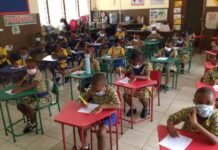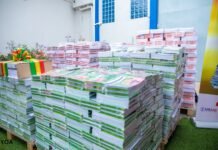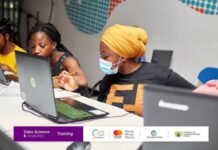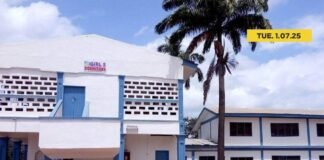Professional Learning Communities (PLC ) is a group of educators and other stakeholders who meet regularly to share expertise knowledge, skills and experience for the improvement in lesson delivery, assessment and academic performance of learners.
It is a collegial group of Administrators and School Staff who are united in their commitment to Learners’ learning.
They function as an effective strategy for building school capacity around core issues of teaching and learning (Darling-Hammond, 1995).
They can serve as a mechanism to transform school culture. In other words, PLCs connect teachers with information, strategies and best practices.
CHARACTERISTICS OF EFFECTIVE PLC
- Shared values and norms.
- Create time for Collaborative work.
- Collective focus on student learning.
- Creation of common work spaces. Arranging for close physical proximity to encourage collaborative work.
- Communication structures to support collaborative work are in place.
- Leadership is supportive of the work of the PLC – Headteachers must be supportive.
- Levels of trust and respect are high among PLC members.
- Administrators and teachers are open to improvement.
Draft guidelines for Professional Learning Communities (PLC)
- PLCs should be conducted once every week.
- The session should be for a minimum of one hour and should be set as the last hour of the day.
- The head teacher will take the lead role.
- Roles should be assigned to encourage participation.
- The activities must focus on the standard-based curriculum.
- The agenda for the next meeting should be developed at the end of each meeting in order for participants to prepare adequately for effective participation.
- Minutes for each meeting should be made available after each session and sent to regional PLC platform for headquarters validation. The platform will be for the following officers from both District and Regional level, Regional Training Officer (RTO), Supervision and Monitoring (S&M), District Training Officer (DTO), Basic School Coordinator, KG coordinator, Headteacher, SISO. Headteacher will appoint any teacher to take minutes.
- From the beginning of every term, PLC sessions should be conducted from the second week through to revision week and specifically on Wednesdays.
- PLCs for French and Kindergarten Teachers should be organized separately and at the cluster level if possible.
KEY ACTORS IN THE PLC
- District Education Oversight Committee (DEOC)
- District Director of Education (DDE)
- District Head of Monitoring and Supervision,
- School Improvement Support Officer (SISO)
- Head Teachers
- Curriculum Leaders/Peer Coaches
- Primary School Teachers (French, KG, B1 to B6)
DEOC/MEOC
Validate the PLC/SBI programme
As a policy making body at the district level, the DEOC would make policies for the implementation of the programme.
Provide supervisory role for the District Education Office in the performance of duties relating to the programme.
DISTRICT DIRECTOR
- Establish a calendar for the integration of PLC activities into district plan
- Provide overall leadership and supervision and assign needed roles to subordinates.
DISTRICT SUPERVISION AND MONITORING OFFICER
- Develop, in collaboration with DDE and School Improvement Support Officer (SISO), a plan for monitoring Fidelity of Implementation (FOI) initiative and the overall evaluation of the success of the PLC/SBI initiative.
- Review, with SISO, monitoring, evaluation & fidelity of implementation data for each term and implement needed changes. In consultation with the DDE, select/recruit peer coaches for the PLC/SBI for each school.
CIRCUIT SUPERVISOR
- Participate in selection/recruitment of peer coaches
- Collect, collate and submit to DEO M&E and FOI data (Nature of data and regularity of collection and reporting to be determined in consultation with NaCCA). Consultation with NaCCA should be at a high level (DDE).
- Identify training needs of head teachers, teachers in partnership with the District Training Officer.
Train head teachers and peer coaches and refer matters relating to attitudes and behaviours detrimental or advantageous to the intervention to the District Head of Monitoring and Supervision for moderation Share/promote the experience of the intervention among schools under his supervision.
HEADTEACHERS
- Attend initial training on PLC/SBI programme
- Ensure stakeholders and School-based Management Committee support for the PLC/SBI program
- Ensure teachers participate actively in Coaching Sessions, and that ALL teachers implement new practices.
Identify and put in place measures to acknowledge teachers who make an effort to implement new practices
Put in place measures to monitor and report on KG 1 to B6 learners’ progress with respect to performance indicators and established national performance standards. Adopt the FOI of learning for accountability.
(BASIC 1-6 Teachers)
Participate actively in all Coaching Sessions activities
Follow the revised curriculum, write lesson plans/notes according to specification and keep track of challenges or difficulties encountered
Try out new teaching activities, strategies and practices discussed during Coaching Sessions and share challenges and successes with teaching colleagues in future Coaching Sessions or PLC sessions
HOW TO CONDUCT AN EFFECTIVE PROFESSIONAL LEARNING COMMUNITY (PLC) SESSION.
Pre-Discussion
- Registration and introduction of participants and key facilitators if any
- Nomination of PLC secretary to take notes of discussion points.
- Identify and discuss challenging themes. i.e. Themes evolving from the Standard-Based curriculum training and implementation.
Check This Out:Education Minister pays tribute to Former Chairman of UNESCO Executive Board (VIDEO)
- A participant with in-depth knowledge on the theme identified should lead discussions.
- Assign areas to different teachers and members of the PLC to research and present at future PLC sessions.
- Encourage discussions and contributions by members.
Discussion stage (action)
- The lead facilitator takes participants through the content and demonstration lessons (where applicable) associated with the theme.
- Facilitation should be participatory, engaging and interactive
Post-Discussion Stage
- At this stage participant evaluate the content and demonstration lesson learnt and assess the extent of improvement. Through reflection and debriefing.
- The agenda for the next meeting should be developed at the end of each meeting in order for participants to prepare adequately for effective participation.
- Participants are expected to improve on their own daily teaching skills through leading questions.
- Participants are encouraged to use group platforms strictly dedicated to PLC for professional learning and providing colleagues with useful professional materials.
Check the PLC Schedule FOR THE 2019/20 academic year HERE
Source: EducationGhana.net
Discover more from EducationGhana
Subscribe to get the latest posts sent to your email.





















